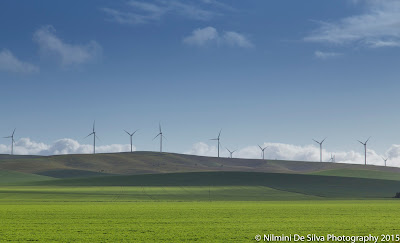I believe that the biggest distinction between the current
government and the other parties in the next Federal Government election will
be on the issue of renewable energy. We will be divided between those of us who
believe that renewable energy is part of our new future and those of us who
will continue to cling to the belief that coal is good for humanity. We live in one of the sunniest and windiest
places on this planet. As we travel throughout Australia, it is obvious this is
a sun-drenched country. We have now been on the road for 5 weeks and except for
a 10-day period in Adelaide where we plugged in, we have lived comfortably on
the energy generated by our one solar panel and the energy we stored while
driving. Of course our energy consumption is now much less than the average
Australian household that consumes about 20kWh/day.
As we pass through the outback, we could also not miss seeing
the poles and wires that crisscrossed the landscape, transporting power to
remote outback stations. Most people would be surprised to learn that only 20% of
their electricity bill is the cost of energy generation, while more than 50% pays
for these poles and wires, i.e. for transporting the electricity to their
house. We learnt this from a Senate
Committee Report (2012), while preparing for a recent presentation on solar
energy. When Australia’s Federal Court recently overturned the construction of
the Adani Carmichael coal mine, our Prime Minister said we were depriving 100
million people in India of the chance to get electricity.
Is this accurate?
According to a recent article in the Guardian: “India’s population of 1.24 billion
comprises 247 million households, 68% of whom live in rural villages. According
to the 2011 census, 45% of these rural households – 75 million – have no
electricity. Of urban households, 6 million remain without electricity, or
about 8% of the total.”
I read that despite India having invested in new electricity
generation during the last 15 years, these numbers have not changed. The main reason for this is obvious. These villages are remote and totally removed
from the existing grid. The cost of
connecting them to the grid is expensive and it is
Their demands are simple and hence giving them a gold plated solution
that involves transporting coal to India from Australia is ludicrous. Even if you did that, none of these people in
these remote communities would be able to afford to pay for the infrastructure.
far cheaper to give these
households an off-grid solution like a solar panel on their roof, or installing
a solar array for the community. Having grown up in the sub-continent and
having travelled widely through India, I have had a few homestays in houses
that have no access to electricity or running water. I know that even if they
had electricity, they would not be able to afford, nor would they demand the
fancy appliances we have in Australia. If you don’t have running water, then
you don’t really need a washing machine!
Here’s the other thing.
Coal is really not great for humanity. It is also not great for our
environment. The poor Indian villager
does not want to breathe the toxins in the fly ash (lead, zinc, arsenic,
cadmium, sulfur, mercury…) any more than any Australian who lives next door to
a coal plant does. I’ve also read that
the cost of producing electricity in India using Australian coal from the
Galilee Basin is double the current average wholesale cost of electricity. It
is the last thing that the Indian villager wants. In fact, the Indian government has announced
that it is now in transition to a renewable future and will probably in the
next 3 years or so have no use for our coal at all.
Here’s another statistic from the guardian:
“Even if one percent
of the India’s land area were to be used to harness the abundantly available
solar insolation at an efficiency of 10%, the country could generate 570 times
India’s current electricity demand”.
Perhaps it is time for us as global citizens to demand we transition to renewables and for us to elect leaders that act responsibly toward both the environment and humanity.



No comments:
Post a Comment